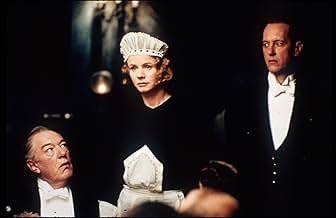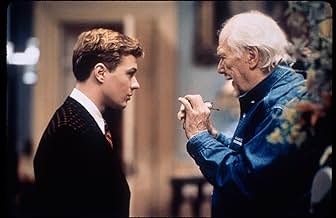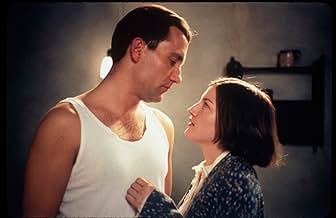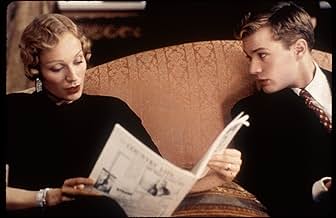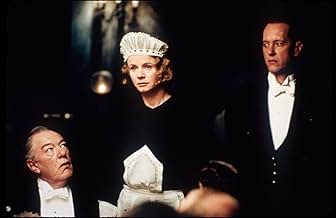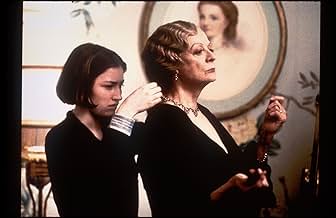Apresenta a vida dos convidados e criados de uma festa de 1932 em uma casa de campo na Inglaterra, enquanto investigam um assassinato envolvendo um deles.Apresenta a vida dos convidados e criados de uma festa de 1932 em uma casa de campo na Inglaterra, enquanto investigam um assassinato envolvendo um deles.Apresenta a vida dos convidados e criados de uma festa de 1932 em uma casa de campo na Inglaterra, enquanto investigam um assassinato envolvendo um deles.
- Direção
- Roteiristas
- Artistas
- Ganhou 1 Oscar
- 36 vitórias e 74 indicações no total
- Direção
- Roteiristas
- Elenco e equipe completos
- Produção, bilheteria e muito mais no IMDbPro
Avaliações em destaque
What was surprising was the level of humour that Altman brings to what is, as it unfolds, a very sad story of transgression and loss. Maggie Smith has all the funniest lines as a viscious but impoverished woman who comes to her family with begging cap in hand. Those playing characters "above stairs" all look and sound the part and effortlessly give the impression of wealth and privelege and the callousness that breeds.
Many of the "downstairs" characters drive the story and there are some wonderfully wry performances from the likes of Richard E Grant and Alan Bates. As the moral centre of the film, Kelly McDonald is excellent and is well matched by Emily Watson as Emily and Clive Owen as Parkes. Ruling the downstairs troop is Helen Mirren whose cool visage hides a seething mass of emotion. A well deserved nomination here.
Only Robert Altman could assemble a cast of this magnitude and distinction and have many of them speak no more than a few lines ! Greats of English theatre like Derek Jacobi have small but memorable roles and there is not a bad note struck from any of the predominantly English cast.
I was slightly puzzled by the character played by Ryan Phillipe (although his perforamce was fine) but felt that the intrusion of two Americans into this English mix worked well to highlight the entrenched class roles played by everyone in the house.
Whilst perhaps not his best work, this is a very good Altman film - we move in and out of conversations whilst never losing their import and the cimematography has a fluidity that few other film makers can match.
A classy piece of film-making that rewards careful attention from the viewer.
Altman's preferences for kaleidoscopic social observation has sometimes failed in the past due to the weight of its own ambition: multi-plotted and multi-charactered snapshots of time and place held together by loose ties or a general thematic framework. Sometimes it pays off spectacularly (Nashville); sometimes it flatters to deceive (Short Cuts).
It works well here due to the necessary discipline of the single location and the greater opportunities for interaction among the characters this affords. Add to that an exemplary cast of (mostly) British character actors and a knowing script by Julian Fellowes that gives Altman's keenly observant camera plenty of time to make its own points.
Rightly, Altman is less concerned with the murder mystery, which is almost an aside, than with the opportunity given by a shooting party at a 1930s stately mansion to observe the English aristocracy and their servants in social interaction.
Never happier than when involved in a bit of human anthropology, Altman lightly dissects the complexities and hierarchies which go on both above and below stairs; in which many subtle and unsubtle rituals are played out among groups of people who clearly dislike each other but are forced through circumstance, need or employment to observe the fundamental social practices required.
1932 is also a time of intruding change into the nature of the old English ruling classes, slowly disintegrating in this between-wars period and, in this case, largely reliant on the wealth of one particularly reluctant patron to keep them in furs and flunkies. In on this act comes the (to them) faintly odious whiff of 20th century new money, represented by Hollywood and popular culture. These intruders are kept in their place, but the message is clear - change is coming, and coming fast.
The muted colours and autumnal setting continue this theme of a world in terminal decline and of a group of characters keenly conscious of place and tradition yet also wearied and exhausted by it. Only at the very end, when fundamental change has occurred and many characters are left to face up to very different destinies do we see a bit of sunshine creeping in, heralding the dawn of a new era.
The cast are all excellent, with special mention deserving of Maggie Smith's effortless scene stealing as a bitchy but broke old Countess; the ever reliable Jeremy Northam as matinee idol Ivor Novello, well aware of his place in the great scheme of things and young Kelly Macdonald in the pivotal role of Smith's harassed maid who's inquisitiveness rattles a whole load of family skeletons.
The film admittedly stinks as a murder mystery---it's almost funny how little Altman himself seems interested in the who-dunnit. But, typically for Altman, it's the deconstruction of the genre that he's interested in, not the genre itself. This movie isn't about a murder in a country house; it's a movie about class differences and people connecting (or not connecting) with one another.
It seems futile to mention stand out performances in a film filled to the rafters with stand-out performances, but I did especially like Emily Watson as a cheeky maid, Helen Mirren as the "perfect servant," and Kelly MacDonald as the novice lady's attendant who grows more than anyone else over the course of the film.
The film is at its best when it's probing the emotional depths of the story---it comes across as a bit too glib when the satire gets especially acidic (mostly with the Kristin Scott Thomas character), but like the best of his movies ("Nashville," "M*A*S*H," "Short Cuts") Altman knows how to control his own cynicism and doesn't let sarcasm rule.
With his on again-off again track record, we can expect the next Altman film to tank, so let's enjoy this one while we can.
Another thing that I want to say about this film, is that after having seen Black Hawk Down a couple of days ago, this movie is as much a technically visual masterpiece as the Ridley Scott film. The use of foreground and background is simply amazing. The choreography and blocking of the movement is perfect. Is it rigid? Yup. And that's the point.
It's a shame that movies like this are refered to as boring and stiff. One reviewer suggested that it would work as a thirty minute short as opposed to a nearly two and half hour long movie. That seems like a ridiculous notion to me because then all it would have been a murder mystery as opposed to what a wonderfully filmed character drama.
And hey, I didn't remember a single name either. Maybe people who have criticized this movie for that should look back and see how many movies they remember all the names of all the characters upon the first viewing. My thought is that most of the names are inconsequential anyhow.
One of the best aspects of film is how it illustrates that fine line dividing the master-servant social structures, and how often that line is crossed, reminding us that life is just a game of costumes and masks, and we're all the same underneath. While the story was reminiscent of Agatha Christie's Ten Little Indians, where it's the mystery that captivates the audience, Altman goes beyond the mystery with Gosford Park by using the murder as a vehicle to draw attention to the human condition and class hierarchy.
On the downside, but to no surprise to fans of Altman's work, the movie is often hard to follow. His style of filmmaking involves entanglements of characters and subplots that don't appear to have much to do with one another at first blush, and Gosford Park takes this to the next level. Here, the murder takes place at the climax of this confusion, leaving you rather disoriented in the middle of the 2-hour-plus drama. Fortunately, the tone loosens up when a comedy-dim police inspector basically gets nowhere in his investigation, but the pieces start coming together through the other characters. The good news is that it all seems to come together in the end in a way that didn't require grasping every detail of every scene.
Despite its intricacies and confusing moments, there is so much more to Gosford Park that makes it interesting and enchanting. While it is clearly a sophisticated piece of film work with impeccable acting, directing and design, don't stress about not keeping up with it all the time. Sit back and take it in, and you'll feel satisfied in the end.
Você sabia?
- CuriosidadesThe camera is always moving (if only slightly) in every shot as requested by producer and director Robert Altman.
- Erros de gravaçãoThe movie takes place in 1932 but some of the songs Ivor Novello sings for the guests didn't come out until years after, like "Glamorous Night" (1935), "Why It Wasn't You" (1937), "I Can Give You a Starlight" (1939) and "Waltz of My Heart" (1939).
- Citações
[Morris Weissman is asked about his upcoming movie project]
Lady Sylvia McCordle: Mr Weissman.
Morris Weissman: Yes?
Lady Sylvia McCordle: Tell us about the film you're going to make.
Morris Weissman: Oh, sure. It's called "Charlie Chan In London". It's a detective story.
Mabel Nesbitt: Set in London?
Morris Weissman: Well, not really. Most of it takes place at a shooting party in a country house. Sort of like this one, actually. Murder in the middle of the night, a lot of guests for the weekend, everyone's a suspect. You know, that sort of thing.
Constance: How horrid. And who turns out to have done it?
Morris Weissman: Oh, I couldn't tell you that. It would spoil it for you.
Constance: Oh, but none of us will see it.
- Cenas durante ou pós-créditosThe cast credits at the end are separated between above stairs, visitors and below stairs, arguably listed in order of status within the British class system.
- ConexõesFeatured in Siskel & Ebert & the Movies: The Best Films of 2001 (2001)
- Trilhas sonorasWaltz of My Heart
Performed by Christopher Northam
Composed by Ivor Novello & Christopher Hassall (as Christopher V. Hassall)
© Chappell/Music Limited
By Kind Permission of Warner/Chappell Music Ltd
Principais escolhas
Detalhes
- Data de lançamento
- Países de origem
- Central de atendimento oficial
- Idiomas
- Também conhecido como
- Muerte a la media noche
- Locações de filme
- Syon House, Syon Park, Brentford, Middlesex, Inglaterra, Reino Unido(interiors: upstairs bedrooms)
- Empresas de produção
- Consulte mais créditos da empresa na IMDbPro
Bilheteria
- Orçamento
- US$ 19.800.000 (estimativa)
- Faturamento bruto nos EUA e Canadá
- US$ 41.308.615
- Fim de semana de estreia nos EUA e Canadá
- US$ 241.219
- 30 de dez. de 2001
- Faturamento bruto mundial
- US$ 87.754.044
- Tempo de duração2 horas 17 minutos
- Mixagem de som
- Proporção
- 2.35 : 1
Contribua para esta página




